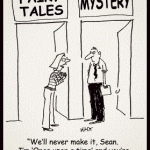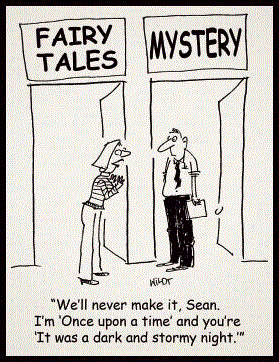 Dropping Literary Reference – Yes or No?
Dropping Literary Reference – Yes or No?
Including literary references in a book is both a compliment to the reader and a gamble.
Readers identifying the reference will feeling part a community sharing similar cultural background, and generate a warm feeling of belonging. Conversely, readers who do not have the knowledge to idntify the reference will feel excluded and it could detrct from the pleasure they derive from their reading experience.
So, how can you include these references without alienating part of your readership, but still catering to your readers “in the know”.
1. Limit references to those books that are so popular that every reader should at least have heard of them, like those on the infographic below. That is ideal for books aimed at the general public

by
Jared.
Explore more
visuals like this one on the web’s largest information design community –
Visually.
2. For more targeted audience, like specific genres such as Science Fiction or Romance for example, use the same idea but chosing the 10 most read books in that genre. “2001 Space Odissey” or “Pride and Prejudice” respectively come to mind, both because the books were widely successful and because the movies based on these books received critical acclaim , increasing the recognition rate.
3. When referencing a less famous book or writer, make sure that the reference is oblique, so that readers “in the know” will identify it and feel included whilst those who do not have the background. This can be done, for example, by naming a place or a character
info based on names of places or characters from the book referred to. i.e. “Ron Breasley” instead of “Ron Weasley” from Harry Potter. Or using a line such as “So it goes” that fans of “Slaughterhouse 5” by Kurt Vonnegut will immediately identify. In both cases, readers unfamiliar with the cultural reference will be able to enjoy the book without problem, never being aware that they have missed out on a layer of understanding.
One of the major mistake when inserting a reference in a narrative is giving it such an importance that readers unable to identify will be unable to understand the meaning of a paragraph. Including a sentence like “He so reminded me of Orbelon that I lost my ability to talk to him as a human being” will be great for those who read
Enchantment’s Reach, undoubtedly a great read, but still not widely known. For the vast majority of readers, however, the reference will be lost and this will negatively affect their understanding of the character’s actions.
So, by all means, including references is a great way to embrace your readers, as long as it is done in such a way that it will not interfere with the understanding of the plot nor alienate readers missing out on the reference.

 Dropping Literary Reference – Yes or No?
Dropping Literary Reference – Yes or No?